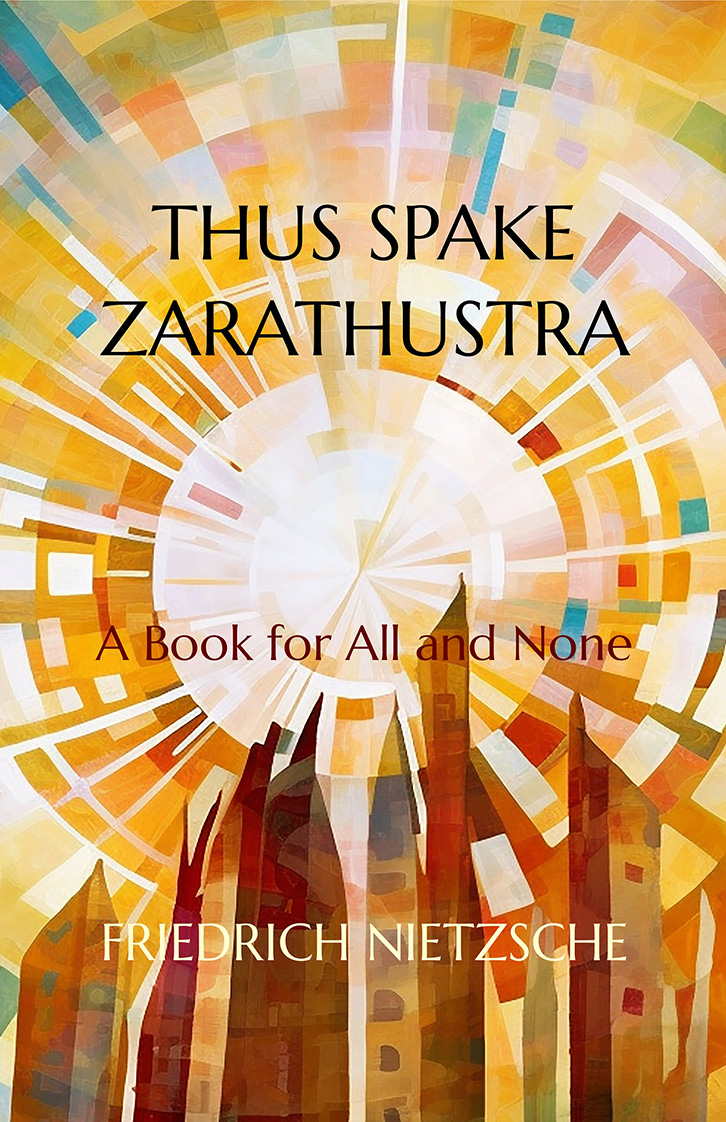Thus Spake Zarathustra Illustrated Edition
Lincoln Cannon
21 June 2023 (updated 3 January 2026)
It is time! It is the highest time! Today, at noontide on the summer solstice, I am thrilled to announce that I have published an extraordinary illustrated edition of Thus Spake Zarathustra, a philosophical novel by German philosopher Friedrich Nietzsche.
Nietzsche’s philosophy is among the most provocative in history. He explored a wide range of ideas across numerous works. Notable examples include Beyond Good and Evil, The Genealogy of Morals, Twilight of the Idols, and The Gay Science. But, in my estimation, Thus Spake Zarathustra stands out as Nietzsche’s masterpiece.
Thus Spake Zarathustra
Nietzsche wrote the original text of Thus Spake Zarathustra in parts, between 1883 and 1885. It wraps his core ideas into an epic story about a prophet, Zarathustra, who descends from mountain solitude to commune with humanity. Through a series of strange encounters, mixed with humorous dialog and poignant discourse, Zarathustra leads us on a journey of transformation. The story consists of four parts.
In part one, Zarathustra explores the integration of body and spirit, and the rejection of traditional moral values. He criticizes life-denying philosophies, and discusses the importance of embracing joys and passions. He also introduces the concept of the Ubermensch, a higher form of humanity or superhumanity. And he explores the relationship between friendship, diverse goals, and love for neighbors.
In part two, Zarathustra learns from a child about self-reflection, criticizes religious manipulation, and warns against mediocrity. He celebrates the beauty of the night, contemplates mortality, criticizes shallow culture, praises the power of poetry, and ponders the death of God and redemption. He also encourages individuals to strive for greatness and authenticity.
In part three, Zarathustra encounters a disillusioned wanderer, and reflects on joy and inner peace. He passes by some, while he confronts others, including apostates and the three evils. He discusses the spirit of gravity, advocates for new values, celebrates resilience and the longing for greatness, and sings a joyful dance-song.
In the last part, Zarathustra responds to a cry of distress from “higher” humanity. When he finally meets them, they converse about compassion, power, superficiality, solitude, imperfection, detachment, self-integration, suffering, scientific limitations, love, awakening, joy, and belief. Together, they institute a new festival. And then, again as before in eternal recurrence, they part ways.
Influence of Zarathustra
Thus Spake Zarathustra has had a profound influence on the world. The book has contributed to the development of existentialism and concepts of superhumanity. And it has generated an enduring influence on philosophy, literature, and culture – particularly religion.
Nietzsche’s work, including Thus Spake Zarathustra, played a crucial role in the development of existentialist philosophy. His ideas challenge traditional notions of morality and traditional conceptions of the human condition. His exploration of the individual struggle for meaning influenced existentialist thinkers such as Jean-Paul Sartre and Albert Camus.
A prominent theme in Thus Spake Zarathustra is the concept of the ubermensch. Sometimes translated as “overman” or “superman,” the ubermensch represents people who transcend traditional morality and embrace a life-affirming philosophy. This idea has inspired thinkers and artists in various disciplines, including Transhumanism and posthumanism.
Thus Spake Zarathustra is not only a philosophical work but also a literary masterpiece. Nietzsche’s use of poetic language, metaphors, and allegories has influenced generations of writers, poets, and artists. His writing style, characterized by powerful imagery and unconventional structure, continues to inspire and captivate readers.
Even beyond philosophy and literature, Thus Spake Zarathustra has had a broad cultural impact. Through the journey of Zarathustra, Nietzsche reimagines the search for meaning in a way that resonates with people across different cultures and time periods. The work has influenced music, film, and popular culture. It has changed the way we think about the world and ourselves.
Perhaps most poignantly, Nietzsche criticized traditional religious beliefs. His infamous proclamation that “God is dead” has instigated endless discussion on religion, atheism, and secularism. His ideas challenge the foundations of Christianity. And they’ve led to important debates about the role of religion in society and morality.
The Illustrated Edition
Thus Spake Zarathustra changed my life. Some mistakenly associate Nietzsche with nihilism, when exactly the opposite is true. Nietzsche helped me escape nihilism. He helped me understand, finally, that we create meaning, as real as any noontide sun.
In gratitude, I share with you my illustrated edition of Thus Spake Zarathustra: A Book for All and None. To imbue Nietzsche’s philosophical work with yet more life, I crafted 85 illustrations that complement the text. My aim is to enhance engagement with and understanding of the ideas. And this, I’m sure, will help many access the power of Nietzsche’s ideas, for the first time or in new ways.
My illustrated edition of Thus Spake Zarathustra is now available in three formats:
-
Thus Spake Zarathustra (Illustrated Edition) ebook format is designed for the greatest possible availability. It includes digital presentation of all 85 illustrations in full color.
-
Thus Spake Zarathustra (Illustrated Edition) paperback format is designed to provide a tangible experience at low cost. It includes all 85 full-page illustrations in black and white.
-
Thus Spake Zarathustra (Illustrated Edition) hardcover format is designed for the best experience and enduring value. It includes all 85 full-page illustrations in full color.
All formats provide the eloquent English translation by Thomas Common. He published his original translation of Nietzsche’s book in 1909. Although there have been subsequent translations, Common’s version was one of the earliest. It facilitated the reception of Nietzsche’s work in the English-speaking world. And it remains one of the best translations.
Pricing information is available on the product details page at Amazon and other ecommerce sites. Buy your copy of this extraordinary work today. And when you’ve received and enjoyed it, please submit a review. Thank you so much!








